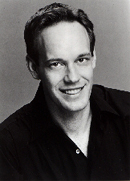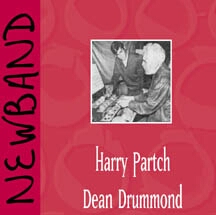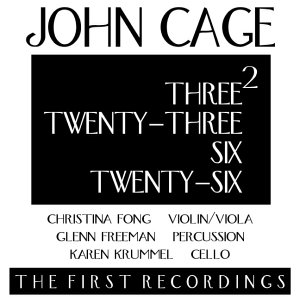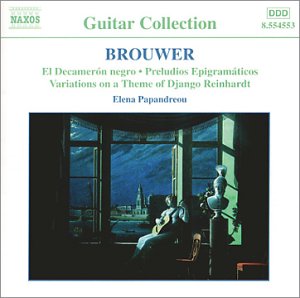 |
|
 |
|
| About Us | Essential
Library |
Read Past Issues | Resources | Composer Links |
|
THE INHERENT DRAMA OF MUSIC (HELPED A BIT): Chamber music has generally been delivered in plain wrappers - small groups of musicians dressed in black performing on a stage. After decades of conventional performances, the Emerson String Quartet, arguably the finest quartet currently performing, "has begun confronting the idea that a concert is inherently a theatrical experience" and has begun performing Shostakovish as part of a visual/dramatic performance. Los Angeles Times 03/17/02 108 YEARS OF MUSIC (OR WAS IT 109?): Leo Ornstein was one of the most innovative American composers of the 1920s - if you'd asked most music critics of the time, they probably would have pegged him as America's brightest music prospect. But by the 1930s he had disappeared from the music scene. Doesn't mean he died though. In fact, he didn't die until a few weeks ago, at the age of 108 or 109 (the year is in dispute). The Economist) 03/14/02 BUILDING A BETTER COMPOSER: The hardest part about being a composer may be that no one ever tells you how to do it. You write works for dozens of instruments that you don't really know how to play, and hope that everything works out. But a new seminar in Minneapolis aims to change the sharp learning curve many composers face. "The musical boot camp, unique in the United States, entailed more than the usual orchestral run-throughs. It involved seminars about copyrighting, licensing and public speaking; sessions about how to write grant applications and deal with unions and contracts, and workshops on how to write better for particular instruments." Minneapolis Star Tribune 03/14/02 WORDS ABOUT MUSIC: Monster, a new Scottish Opera about Mary Shelley and Frankenstein by Sally Beamish and Janice Galloway has revived a longstanding debate about the relationship between words and music in opera. "The libretto is elegant, the music full of beauty and invention. Why, then, does the combination not quite catch fire?" The Observer (UK) 03/10/02 WHEN CONTROVERSY DOESN'T SELL: A controversial English National Opera production of Verdi's Masked Ball that featured "male rape, transvestites, dwarves, Elvis impersonators and a row of chorus singers using the toilet without washing their hands" got lots of attention in the press last month. But it was something of a flop with audiences. The production sold few tickets. The Guardian (UK) 03/09/02 DESPERATELY SEEKING AN IDENTITY: Almost since its inception, New York's City Opera has been the bastard stepchild of the Gotham opera scene. Overshadowed by the Met, ignored or reviled by its Lincoln Center masters, and confined to a ballet theater specifically designed to muffle sound, the company recently saw its fortunes turn with a massive gift towards the purchase or building of a new home. But even with the cash infusion, City Opera constantly runs the risk of seeming directionless, and must always struggle to be noticed in a city overflowing with culture. New York Observer 03/18/02 PUCCINI A LA BAZ: When Baz Luhrmann's bohemian odyssey Moulin Rouge hit theaters last year, with its over-the-top theatrics and reworked pop songs, "some critics reached for rhapsodic analogies, others for aspirin bottles." Luhrmann's next project is a daring attempt to bring Puccini's La Boheme to Broadway, and to do it without bastardizing the music as with Elton John's Aida. "His idea is not exactly to reinvent La Boheme, but to make it accessible for audiences unschooled in the opera tradition." The New York Times 03/14/02 BUSINESS CORRECTION: Even if classical music recording is on the wane, what does it really say about the health of the artform? Not much. "What's left when the record companies, with all their marketers and middlemen, finally fade away is a world full of artists left to their own considerable devices, making records, not for the promise of nonexistent glory, but for the sake of the music. Recordings, I wager, will be fewer, but they will have been made with more of a sense of mission." Andante 03/13/02 CLASSICAL RADIO ALTERNATIVES: Classical music stations are going off the air as station licenses become more valuable and owners look for more profitable formats. That doesn't mean classical listeners are going away - they're just finding other outlets such as digital radio and the internet. Christian Science Monitor 03/15/02 SPEEDING TO THE BEAT: An Israeli researcher says drivers who listen to fast music in their cars may have "more than twice as many accidents as those listening to slower tracks." The study demonstrated that while listening to fast music "drivers took more risks, such as jumping red lights, and had more accidents. When listening to up-tempo pieces, they were twice as likely to jump a red light as those who were not listening to music. And drivers had more than twice as many accidents when they were listening to fast tempos as when they listened to slow or medium-paced numbers." New Scientist 03/130/02 |
An Interview with Gloria Coates
In 1986, Coates was one of the 10 finalists for the International Koussevitsky (KIRA) Award which honors a living composer for an important work for her composition "Music on Open Strings." She has been the recipient of numerous awards, commissions and distinctions. Coates' music has been performed by leading soloists, ensembles and orchestras such as the Bavarian Radio Symphony Orchestra, Brooklyn Philharmonic, Stuttgart Philharmonic, Milwaukee Symphony, Saint Paul Chamber Orchestra, the London Sinfonia, Polish Chamber Orchestra, various international chamber ensembles including Das Neue Werk Hamburg, the Dresden Ensemble for New Music and the Kronos Quartet. Her work Music on Open Strings, written in1973 for orchestra, was premiered at the Warsaw Autumn of 1978 and proved to be the most widely discussed work on the Festival. In 1979 she was commissioned to write a work for the East Berlin Festival, the first non-socialist composer ever to be performed on it. Some other Festivals include the Dresden Festival, New Music America - New York 1989, Musica Viva Munich, The New York Microtonal Festival, Henze's Festival Montepulciano, Passau International Festival, and the Dartington Festival in England. From 1969 to 1989, Coates lived in Europe where hers was a powerful voice on behalf of American music. She has lectured, written musicological articles, produced and broadcast radio programs, and organized a concert series of German-American music in Munich from 1975 - 1984. Since 1989 Gloria Coates has divided her time between the United States and Europe. In addition to her composition, she is a trained painter and the CD covers featured in this article are photos of her work. Coates'
canon of work includes compositions for orchestra (13 symphonies), chamber
(7 string quartets) and solo music, vocal (a song cycle on poems by Emily
Dickinson), choral music, live electronic and music for the theater. Her
string quartets 1, 5 and 6 have just been released on Naxos CD.
S21: You are best-known for your symphonies. How do you decide what constitutes a symphony? What elements must a work contain to be a symphony rather than, say, an Essay as Barber sometimes called his pieces)? Does your definition somehow relate to Mahler's idea that a symphony is a work that contains everything it takes to make a "world?" GC: It was never an intention of mine to write a symphony, although since 1973 I had written quite a number of orchestral works with three or four movements, always changing the titles and never being satisfied. Sometimes they would be related to the structures such as "Music on Open Strings" and sometimes to the emotional content such as "Illumination in Tenebris." Finally in 1990, all titles seemed totally unfitting to a new orchestral work which lasted a half hour and had 52 instruments playing simultaneously. This was a very serious work and had used various structures that I had developed over many years in a new way, and it seemed heavier in comparison to my other compositions.
Classical Grammy Winners
|

Dead Man Walking Composer: Jake Heggie Conductor: Patrick Summers Performer: Susan Graham, Frederica von Stade Ensemble: San Francisco Opera Chorus and Orchestra Wea/Atlantic/Erato - #86238 No "Nixon in China" or "Einstein at the Beach" but young Heggie has a way with melody and this debut opera suggests there may be better things to come. |
A Prole do Bebe No. 2, Cirandinhas Composer: Heitor Villa-Lobos Performer: Sonia Rubinsky Naxos - Flat out fantastic. Rubinsky makes child's play of Villa-Lobos' thornier conceits. If you live in New York, write this down: Sonia Rubinsky will be performing selections from Vol. 2 and the upcoming Villa-Lobos: Piano Music Vol. 3 on March 14th, Thursday, at 6:30 pm at the Klavier-Haus located at 211 West 58th St. |
Music for the Movies Alfred SCHNITTKE (1934-1998) Composer: Alfred Schnittke Conductor: Frank Strobel Ensemble: Rundfunk-Sinfonieorchester Berlin, Rundfunkchor Berlin Cpo Records Schnittke regarded film music as a legitimate expressive medium and wrote more than sixty film scores and worked with the prominent directors of his day. This collection demonstrates that he understood film composition thoroughly and considered it a new vista for his creative work. |

NEWBAND Composers: Harry Partch, Dean Drummond Innova 561 Works by former cohorts and microtonal pioneers, Harry Partch and Dean Drummond. This stunning new recording is performed by members of Newband primarily on the original Partch collection of hand-made instruments, notable for their sculptural and acoustic beauty. The music integrates declaimed poetry (masterfully performed by Bob Osborne) with colorful instrumental accompaniment. The Drummond pieces are first recordings, the Partch are the first since the 1940s. |
|
Preludes & Fugues for 13 solo strings: Three Postludes; Fanfares Composer: Witold Lutoslawski Conductor: Antoni Wit Naxos - #8555270 A treasure trove of Lutoslawski's "little" works, with lots of delightful listening for even those not fully committed to 20th century work. |
Passacaglia, Symphony, Five Pieces Passacaglia, Symphony, Five Pieces Composer: Anton Webern Conductor: Takuo Yuasa Ensemble: Ulster Orchestra Naxos Who knew that the Second Viennese School could be so...listenable. Has the music changed or have our ears adapted to the atonality? |
Concerto for Strings Composer: Joly BRAGA SANTOS Performer(s): Braga Santos, Creswick, Somov, Blair, Cassuto Marco Polo - Joly Braga Santos is one of the most interesting and gifted composers of the 20th century--and one of the most unknown. His musical language is based on a strong sense of architecture and drama, with generous melodic lines and a natural instinct for structure and formal coherence. If you don't know the work of this 20th century Portugese master, grab it. |
Symphony No. 1 Composer: George Barati Conductor: Laslzo Kovaks, Vladimir Valek Ensemble: Budapest Symphony Orchestra, Czech Radio Symphony Orchestra Naxos - The First Symphony was written in 1963 during a stay in Switzerland. Set in three movements, it is packed with musical incident. The Chant of Darkness was composed in 1993 as an expression of the composerís grief as his daughter lay dying from cancer. The work exhibits a frightening sense of finality. The Chant of Light dates from 1994-5 and is cast in a simple structure, displaying Baratiís love of working with small motivic cells, combined with the use of luscious orchestral color. |

90% Post Consumer Sound Composer: Ellen Band Performer: Adele Armin Ellen Band Band creates 'sound art' from everyday noises with results that sometimes sound celestially musical and sometimes sound like..well everyday noises. |

Three2, Twenty-Three, Six, Twenty-Six Composer: John Cage Performer: Christina Fong, Glenn Freeman, et al. Orchard - #6260 |
String Quartets 1 & 2 Composer: Arnold Bax Performer: Maggini Quartet Naxos - Fresh from the Gramophone Award-winning Naxos recording of Vaughn Williams, the Maggini turn their attention to another English composer of elegiac melodies with superb results. |

Guitar Music, Vol. 2 Composer: Leo Brouwer Performer: Elena Papandreou Naxos - One of the best writers for the guitar alive today, Brouwer combines elements of his native Cuba with jazz and European modernism. Papandreou performs these tricky pieces elegantly. |
|
One-Minute Web Guide The essential guide to intelligent life on the internet |
Publisher: Duane Harper Grant (212) 582-4153 Editor: Jerry Bowles (212) 582-3791 Contributing Editors: Armando Bayolo, Sam Bergman, Joshua Cohen, Karina Cristina Demitrio, Deborah Kravetz (C) Sequenza/21 LLC 2000 |